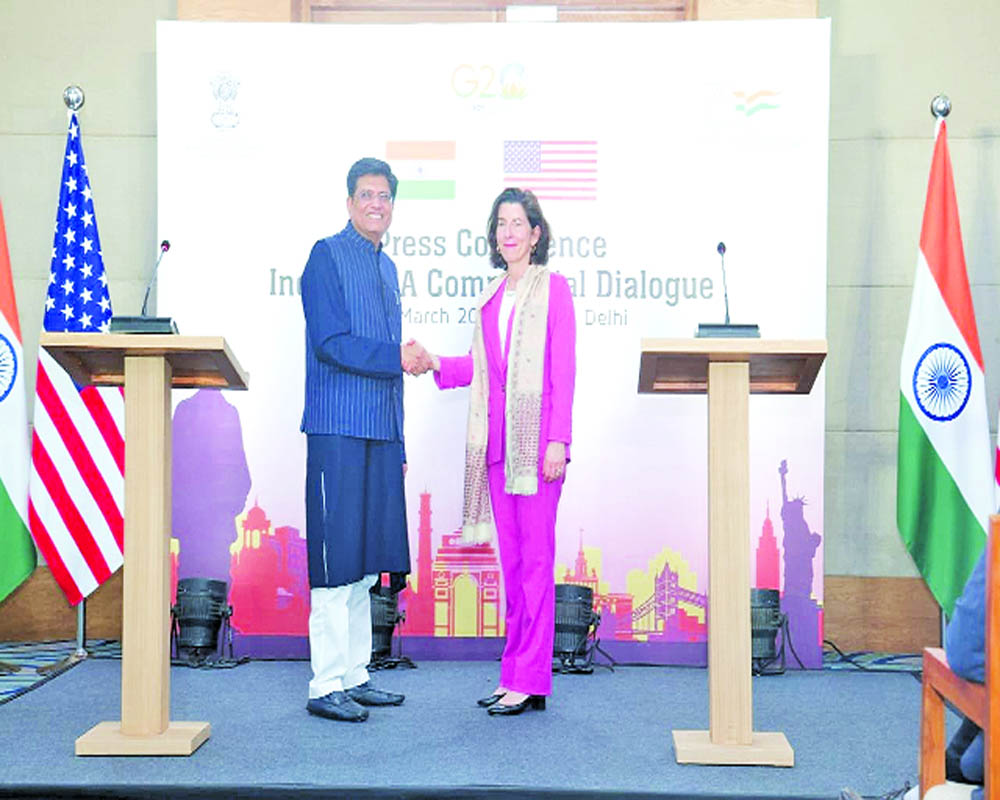More coordination on multilateral forums would be good for both
India and the US resumed their bilateral commercial dialogue after a gap of three years. In their fifth ministerial-level meeting, US commerce secretary Gina Raimondo and Indian commerce and industry minister Piyush Goyal focused on enhanced economic cooperation, in a new world order, facing supply chain issues in all crucial industries.
India and the US launched the strategic dialogue in 2009, which has been the primary conduit for increasing cooperation, on matters related to regional security, economic cooperation, defence and trade-related issues. In 2015, Indian PM Narendra Modi and US President Barack Obama, upgraded the US-India strategic dialogue to strategic and commercial dialogue, bringing in the focus of greater and more coordinated economic cooperation between the world’s largest democracies, with a sharp focus on security and prosperity for the Indo Pacific region. Even as the defence partnership between India and the US is reaching new peaks every year, having been accelerated in the last two years, due to the Russian invasion of Ukraine, these two nations continue to be engaged on security and economic issues on multilateral and plurilateral forums. After years of being non-committal, the COVID-induced impact on the economy and China’s military aggression to unilaterally alter land borders with India led India to come back with renewed energy into the grouping of nations, QUAD, whose members have shared interests in an open, free, and rules-based Indo Pacific region. Meanwhile, the Biden administration also put its weight behind the QUAD grouping, elevating it to leadership-level meetings, from the level of the external affairs minister. Australia, facing a bunch of trade issues and economic bullying by China, and Japan, facing similar security threats, provide the sealing bonds to make QUAD an important forum.
It is against this background that the US India commercial dialogue took place in New Delhi last week, coming close to the QUAD foreign ministers’ meeting and IPEF special negotiating round held in Delhi earlier. Both partners initiated a mid-year review mechanism for mutually agreed objectives as part of the commercial dialogue. The priority item identified, was, building supply chain resilience. According to the joint statement released after the dialogue, "These efforts will identify opportunities for growth and challenges to address in order to ensure that the U.S. and Indian semiconductor industries develop stronger connections, complementary ecosystems, and a more diverse supply chain for semiconductors."
A separate semiconductor subcommittee was created, comprising senior representatives from the US Department of Commerce and Ministry of Electronics and Information Technology and the Ministry of Commerce and Industry from the Indian side. This sub-committee has been tasked with holding its first round of deliberations ahead of the proposed mid-year review. Aligning the outcomes from the commercial dialogue, with the just-born, cooperation framework on critical and emerging technologies, iCET ( US India Initiative on Critical and Emerging Technologies), both nations agreed to set up India's US strategic trade dialogue. This dialogue between the US Department of Commerce and the Ministry of External Affairs, India, aims to "address export controls, explore ways of enhancing high technology commerce, and facilitate technology transfer."
The other priority sectors identified during the commercial dialogue included climate change and clean technology cooperation, an area that has attracted the attention of both the Indian Prime Minister and the US President. Inclusive digital growth and post-pandemic economic recovery for small and medium-sized enterprises were the other items to be prioritised by the commerce ministers of India and the US. These democracies realise the increased need for engagement and cooperation with trusted partners on security, technology, and trade. A coordinated approach across several multilateral forums could also be expected.
(The author is a foreign affairs commentator)


























